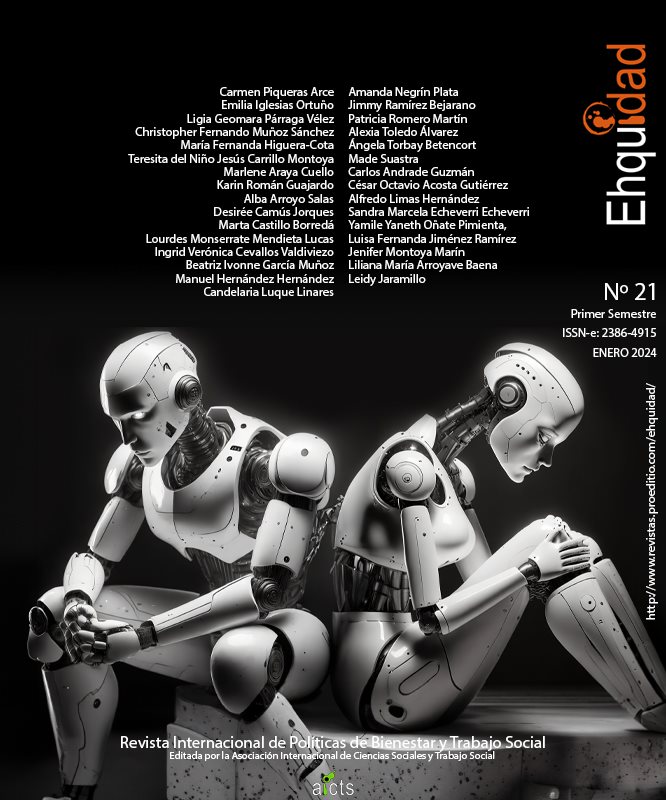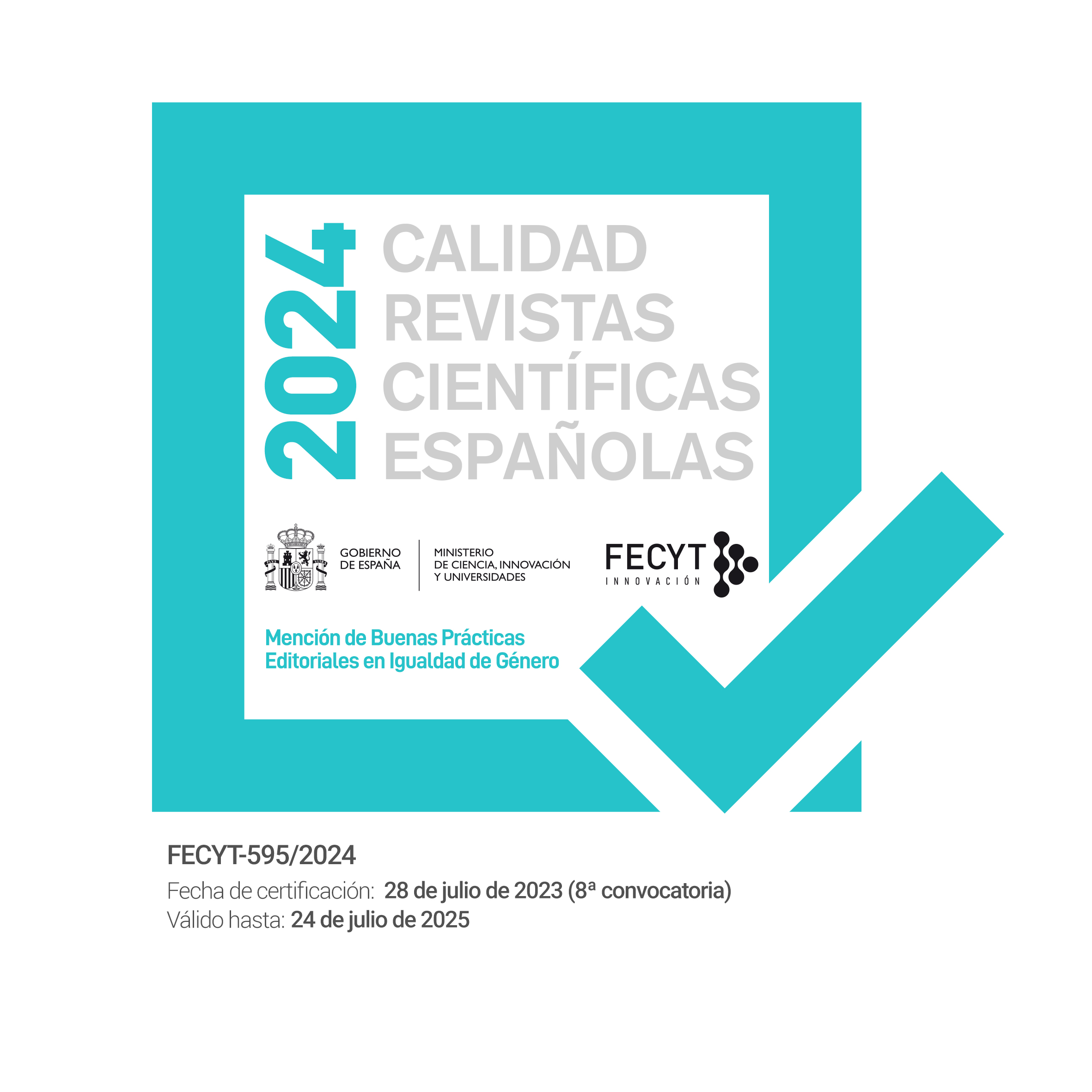Strategies for the autonomy of women
An analysis of formal support networks in northwestern Mexico
DOI:
https://doi.org/10.15257/ehquidad.2024.0003Keywords:
Female autonomy, Formal support networks, Public PolicyAbstract
The present study aims to analyze the strategies for the autonomy of women in the Northwest of Mexico, focusing on the formal support networks existing in the region. Using formal networks as a measure to evaluate public policy provides a more comprehensive view of its implementation, considering elements such as the institutional structure, the interdependence of actors, rules and regulations, and collective decisions. This helps to identify strengths and weaknesses in the implementation of the policy and generate recommendations to improve its effectiveness and achieve the proposed objectives.
Downloads
References
Aranda, V. (2021). Las autonomías de las mujeres: Documento de la capacitación. El reconocimiento del sujeto de derecho de las mujeres para el ejercicio de sus autonomías. FLACSO. https://flacsolab.cl/wp-content/uploads/2021/11/Las-Autonomias-de-las-Mujeres-1.pdf
Becerra, A. y Santellan, P. (2018). Mujeres: Entre la autonomía y la vida familiar. Noésis. Revista de Ciencias Sociales y Humanidades. 27(53), 121-139. https://www.scielo.org.mx/pdf/noesis/v27n53/0188-9834-noesis-27-53-121.pdf
CNDH (2019). Día internacional de la mujer. https://www.cndh.org.mx/index.php/noticia/dia-internacional-de-la-mujer
CNDH (2022). Ley General de Acceso de las Mujeres a una Vida Libre de Violencia.
https://www.cndh.org.mx/sites/default/files/documentos/2019-04/Ley_GAMVLV.pdf
CNDH (2023). Reconocimiento del derecho al voto de las mujeres mexicanas. (09 de enero de 2023) https://www.cndh.org.mx/noticia/reconocimiento-del-derecho-al-voto-de-las-mujeres-mexicanas
Comisión Interamericana de Mujeres y Organización de los Estados Americanos (2011). El Avance de la igualdad de género en el marco del trabajo decente. CIM. https://www.oas.org/es/CIM/docs/AvanceGeneroTrabajoDecente-SP[Final-Web].pdf
Comisión Económica para América Latina y el Caribe/ Secretaría General Iberoamericana (2011). Espacios iberoamericanos: hacia una nueva arquitectura del Estado para el desarrollo. Naciones Unidas. https://www.cepal.org/es/publicaciones/3132-espacios-iberoamericanos-nueva-arquitectura-estado-desarroll
CEPAL (2018). Datos, algoritmos y políticas: la redefinición del mundo digital. CEPAL https://repositorio.cepal.org/server/api/core/bitstreams/c67b0d24-a651-42f1-ae3f-174d3455afd7/content
CEPAL (2019). La autonomía de las mujeres en escenarios económicos cambiantes. CEPAL. https://repositorio.cepal.org/items/d09b80cd-629a-41d5-b033-fa64601f3269
DOF (1996). Programa Nacional de la Mujer 1995-2000. (22 de febrero de 2023) https://dof.gob.mx/nota_detalle.php?codigo=4896477&fecha=21/08/1996#gsc.tab=0
Del Canto, E. y Silva, A. (2013). Metodología cuantitativa: abordaje desde la complementariedad de las ciencias sociales. Revista de Ciencias Sociales, 3(141), 25-34. https://revistas.ucr.ac.cr/index.php/sociales/article/view/12479/11722
Gobierno de México (2013). ¿Qué es el Instituto Nacional de las Mujeres? Recuperado el 17 de marzo de 2023, de https://www.gob.mx/epn/articulos/que-es-el-instituto-nacional-de-las-mujeres
Gobierno de México (2021). Los primeros pasos del Inmujeres. (11 de marzo de 2023) https://www.gob.mx/inmujeres/es/articulos/los-primeros-pasos-del-inmujeres?idiom=es
Instituto Nacional de las Mujeres (2023). Centro de Documentación Inmujeres. (17 de marzo de 2023) https://www.gob.mx/inmujeres
Lagarde, M. (1999). Claves feministas para el poderío y la autonomía de las mujeres: Memoria. Instituto Andaluz de la Mujer.
Maldonado, C. (2017). El rol del docente como favorecedor del desarrollo de la autonomía en los niños de tres años de una I. E. de Miraflores. [Tesis de Licenciatura, Pontificia Universidad Católica del Perú]. https://tesis.pucp.edu.pe/repositorio/bitstream/handle/20.500.12404/8914/Maldonado_Palacios_Rol_docente_favorecedor_1.pdf?sequence=1#:~:text=Autores%20como%20Piaget%20(1968)%2C,el%20sentido%20de%20responsabilidad%2C%20etc
Mazo, H. (2011). La autonomía principio ético contemporáneo. Revista Colombiana de Ciencias Sociales. 3(1), 115-132. https://revistas.ucatolicaluisamigo.edu.co/index.php/RCCS/article/view/880/829
Mendoza, H. y Bautista, G. (2002). Probabilidad y estadística. Universidad Nacional de Colombia. http://www.virtual.unal.edu.co/cursos/ciencias/2001065/
Naciones Unidas (2005). Objetivos de desarrollo del milenio: Una mirada desde América Latina y el Caribe. CEPAL. https://repositorio.cepal.org/server/api/core/bitstreams/de38b298-8084-46aa-85f8-2f016bf7f28c/content
NDI (2020), Análisis de datos para el monitoreo de redes sociales: Guía sobre técnicas, herramientas y metodologías de monitoreo y análisis de redes sociales. https://www.ndi.org/sites/default/files/242005_NDI_Social%20Media%20Monitoring%20Guide_Spanish.pdf [fecha de consulta: 24 de marzo de 2023].
Observatorio de Igualdad de Género de América Latina y el Caribe. (8 de febrero de 2022). Interrelación de las autonomías. https://oig.cepal.org/es/autonomias/interrelacion-autonomias#:~:text=La%20autonom%C3%ADa%20se%20convierte%20en,como%20sujetos%20plenos%20del%20desarrollo
ONU (2023). Conferencia Mundial del Año Internacional de la Mujer 19 de junio a 2 de julio de 1975, Ciudad de México, México. (22 de febrero de 2023) https://www.un.org/es/conferences/women/mexico-city1975
ONU (2023a). Cuarta Conferencia Mundial sobre la Mujer, 4 a 15 de septiembre de 1995, Beijing, China. Recuperado el 11 de marzo de 2023, de https://www.un.org/es/conferences/women/beijing1995
Román, R. y Smida, A. (2017). Una reflexión ex post facto sobre la conducción de estudios multicas para la construcción de teoría de en ciencias de gestión. INNOVAR. Revista de Ciencias Administrativas y Sociales. 27(64), 129-144.
https://doi.org/10.15446/innovar.v27n64.62373
Terán, M. (2014). Test para la identificación de la red social de apoyo social. Cuaderno 3. UNAM.
UNWTO (2023, marzo 07). El empoderamiento de las mujeres y el turismo. https://www.unwto.org/es/el-empoderamiento-de-las-mujeres-y-el-turismo
Zafra, O. (2006). Tipos de Investigación. Revista General José María Córdova, 4(4), 13-14. https://www.redalyc.org/pdf/4762/476259067004.pdf












